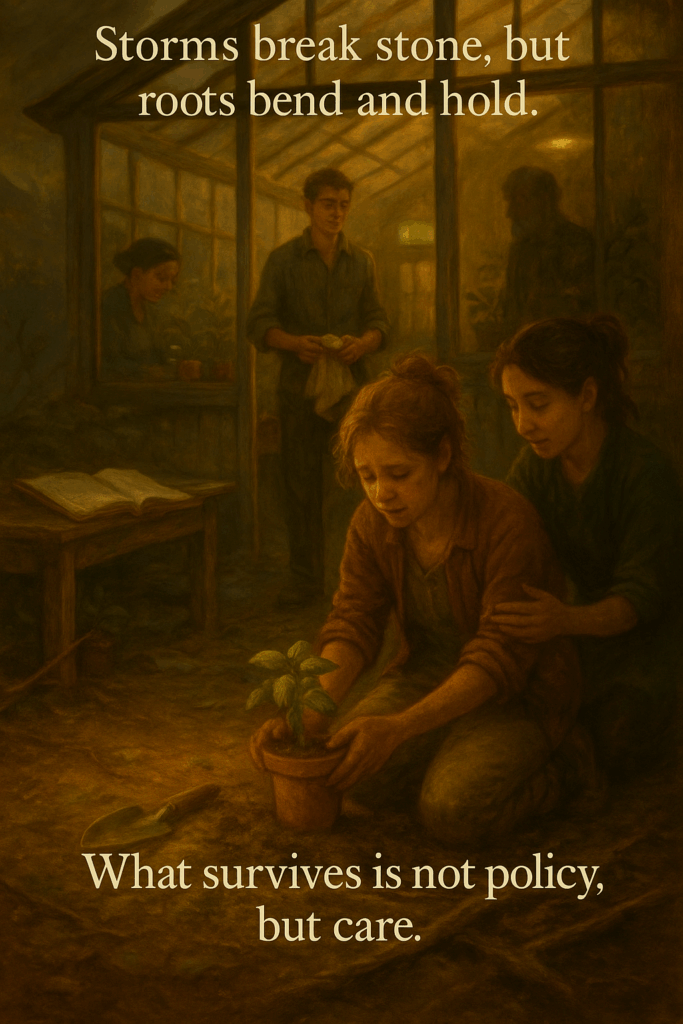
Dawn broke over a school washed clean and wounded. The air, still thick with the scent of wet plaster and damp earth, carried a strange humility. In the library, students moved like medics on a battlefield, carefully extracting books from the wreckage of the collapsed ceiling and laying them out on tarps in the courtyard to dry in the pale sun. The splintered bones of study carrels poked from a mound of soggy insulation and broken drywall.
Lara was there. Not directing, but working. Her gold blazer was gone, discarded over a chair back. Her rolled-up sleeves were smeared with grime, a dark streak across her cheek where she’d pushed back her loose, un-gelled hair. She hefted a sopping box of periodicals, arms straining with effort that was physical, real, and utterly unfamiliar. Her gaze fell on a water-ruined copy of Leaves of Grass, its pages bloated and fused together. She stared at it as if reading her own epitaph.
The greenhouse door stood open, a declaration. Inside, the rhythm was one of triage and assessment. Emil and Mrs. Nouri moved down the seedling trays, their touch gentle.
“This one’s shock is surface-deep,” the old groundskeeper murmured, cradling a wilted basil shoot. “See? The stem is still green. It remembers the sun.”
“And this one?” Emil asked, pointing to a toppled tomato plant.
“Ah,” Mrs. Nouri smiled faintly. “Bruised, but not broken. Already bending back toward the light. It is adapting.”
Priya and Kai documented the storm’s impact with a calm precision, noting damage and repair alike. Mateo was already measuring a cracked pane for replacement. Leo and Aisha rewired the sensor array, its cheerful green blink a quiet victory in itself.
On the bench, the ledger lay open. New entries bloomed across the page:
“Collective library salvage effort — 60+ volunteers.”
“M. Nouri — trauma assessment for seedlings.”
“Kai & Priya — damage documentation for proposal.”
It was no longer a record. It was a living chronicle of resilience.
Lara appeared at the threshold. She didn’t speak, didn’t ask for entry. She simply stood, holding Mateo’s waterlogged blueprints. Her posture was not of a leader, but of a messenger. The grime on her hands, the fatigue in her shoulders—credentials more honest than any election result.
Emil looked up, met her gaze. He held out a clean rag. Not an invitation, not a pardon. A simple tool for a dirty job.
She took it, her eyes falling on the damaged plants. “The engineer…” she began, her voice rasping, stripped of polish. “He said without the stamped schematics, the risk wasn’t… verifiable.” The word, once her weapon, now tasted like ash.
“Risk isn’t something you verify in an office,” Emil said softly, touching the stem of the adapting tomato plant. “It’s something you feel in the ground. You live it.”
From the corner, Grandfather watched, sipping tea from a chipped mug. His eyes held no judgment, only a deep, patient knowing. He spoke to Emil alone. “A fallen tree isn’t an end. It is light for the saplings below. The question is not whether to shelter her from her storm.” His gaze drifted to Lara, who was staring at Mrs. Nouri’s skilled hands with something like awe. “The question is whether she is ready to pick up a trowel. To tend, not command. To listen to the soil, not dictate to it.”
As if hearing him, Lara’s eyes lifted from the plants to the open ledger. She took a step closer, seeing her own failure recorded there not as defeat, but as weather—a storm endured. She saw the names, the proofs of a strength she had never known.
“Policy 7.1…” she said haltingly. “The permit process… it needs to be torn up. Rewritten.” She looked at Emil, then Priya, Leo, Mateo. “By people who understand what actually holds this place together.”
Elias appeared behind her, mop in hand, tie loosened. “We can start with the library repairs. Then the policy rewrite. The council…” He glanced at Lara, a silent transfer of authority in his look. “…we’re ready to listen.”
Lara didn’t step fully into the greenhouse. Instead, she knelt on the path outside, where Sam was carefully repotting the rescued basil. Wordlessly, Sam handed her a small trowel and an empty pot. Lara’s hands, so deft with pen and policy, were clumsy in the soil. She packed it too tightly, then too loose, until Sam gently repositioned her fingers, showing her the right touch.
Her fingers, dark with earth, settled the basil plant into its new home. A small thing. A tiny act of repair. Yet in the silence of the greenhouse, it was louder than any assembly speech.
The sensor on the wall blinked its steady, unwavering green.
It did not celebrate.
It did not forgive.
It only measured the truth of the moment: life, persisting.
The fortress had fallen.
But the garden had learned to grow on stone.

